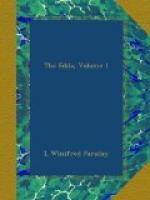me, dew has drenched me, I have long been dead.”
He gives the name Wegtam, or Way-wise, and then follow
question and answer until she discovers his identity
and will say no more. In
Voeluspa there
is no descriptive introduction, and no dialogue; the
whole is spoken by the Sibyl, who plunges at once
into her story, with only the explanatory words:
“Thou, Valfather, wouldst have me tell the ancient
histories of men as far as I remember.”
She describes the creation of the world and sky by
Bor’s sons; the building by the Gods of a citadel
in Ida-plain, and their age of innocence till three
giant-maids brought greed of gold; the creation of
the dwarfs; the creation of the first man and woman
out of two trees by Odin, Hoeni and Lodur; the world-ash
and the spring beside it where dwell the three Norns
who order the fates of men. Then follows an allusion
to the war between the Aesir and the Vanir, the battle
with the giants who had got possession of the goddess
Freyja, and the breaking of bargains; an obscure reference
to Mimi’s spring where Odin left his eye as
a pledge; and an enumeration of his war-maids or Valkyries.
Turning to the future, the Sibyl prophesies the death
of Baldr, the vengeance on his slayer, and the chaining
of Loki, the doom of the Gods and the destruction
of the world at the coming of the fire-giants and
the release of Loki’s children from captivity.
The rest of the poem seems to be later; it tells how
the earth shall rise again from the deep, and the
Aesir dwell once more in Odin’s halls, and there
is a suggestion of Christian influence in it which
is absent from the earlier part.
Of the other general poems, the next four were probably
composed before 950; in each the setting is different.
Vafthrudnismal, a riddle-poem, shows Odin in
a favourite position, seeking in disguise for knowledge
of the future. Under the name of Gangrad (Wanderer),
he visits the wise giant Vafthrudni, and the two agree
to test their wisdom: the one who fails to answer
a question is to forfeit his head. In each case
the questions deal first with the past. Vafthrudni
asks about Day and Night, and the river which divides
the Giants from the Gods, matters of common knowledge;
and then puts a question as to the future: “What
is the plain where Surt and the blessed Gods shall
meet in battle?” Odin replies, and proceeds
to question in his turn; first about the creation
of Earth and Sky, the origin of Sun and Moon, Winter
and Summer, the Giants and the Winds; the coming of
Njoerd the Wane to the Aesir as a hostage; the Einherjar,
or chosen warriors of Valhalla. Then come prophetic
questions on the destruction of the Sun by the wolf
Fenri, the Gods who shall rule in the new world after
Ragnaroek, the end of Odin. The poem is brought
to a close by Odin’s putting the question which
only himself can answer: “What did Odin
say in his son’s ear before he mounted the pyre?”
and the giant’s head is forfeit.




